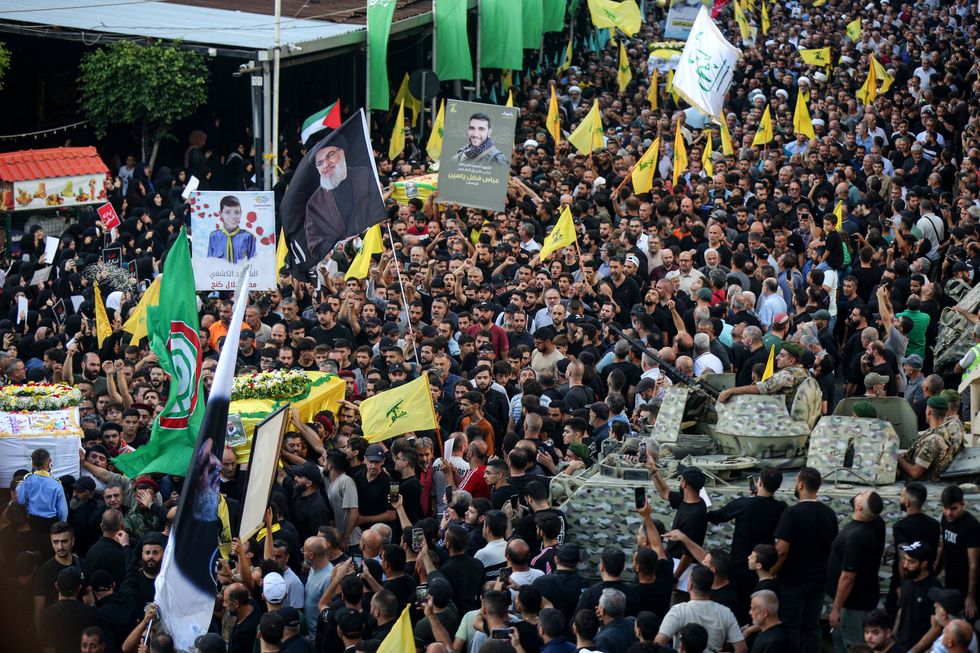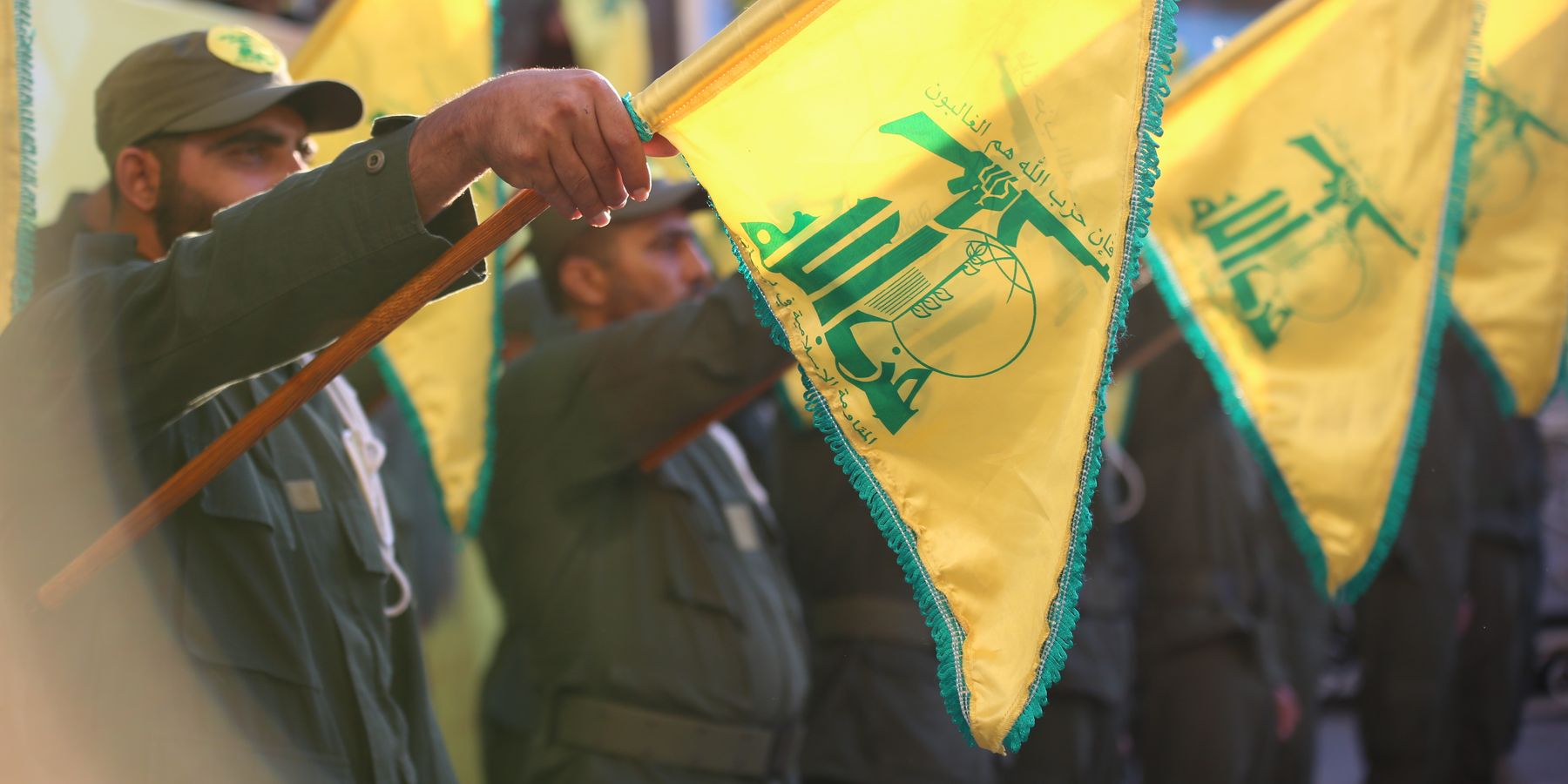The Secretary-General of the Lebanese Hezbollah movement, Sheikh Naim Qassem, recently asserted that continued instability in Lebanon does not serve U.S. interests.
Qassem made the remarks following an Israeli airstrike on Beirut’s southern suburbs which Israel claimed had targeted a Hezbollah weapons depot.
“Put pressure on America and make it understand that Lebanon cannot rise if the aggression doesn’t stop,” he said, addressing senior Lebanese state officials. He added that Washington has interests in Lebanon, and that “stability achieves these interests.”
Those statements mark a notable shift from the fiery anti-American rhetoric historically employed by senior officials of the Lebanese Shiite movement. They also represent a rare public acknowledgement and recognition of U.S. interests in a stable Lebanon. This offers an opportunity worth exploring by the Trump administration and provides it with a strong motive to press Israel to refrain from conducting attacks on Lebanese targets.
Unlike previous Israeli attacks on the Lebanese capital following last November’s ceasefire agreement, Israel did not claim that its latest strike was provoked by any alleged action by Hezbollah. The Israeli military conducted its first post-ceasefire strike on Beirut last March after two missiles were launched at Israel from southern Lebanon.
Despite suffering immense losses in its latest war with Israel, Hezbollah remains an important player in Lebanon, not least because it retains widespread support within the Shiite community, the largest sectarian group in the country. This support was reflected in the funeral procession for its former leader, Sayyed Hassan Nasrallah, who was killed in an Israeli airstrike last September. According to Reuters news agency, hundreds of thousands of people took part in this procession. (Pro-Hezbollah media outlets put the figure at 1.4 million).
If anything, events in neighboring Syria, where some Alawite and Druse communities have been subject to killings and massacres under the new Sunni-led regime, have strengthened Lebanese Shiite support for Hezbollah as their most reliable protector against a Sunni extremist threat.
As a result, Hezbollah’s public recognition of U.S. interests in Lebanon will likely translate into much broader popular acceptance across the country. Moreover, there is reason to believe that the Shiite movement would commit to its word. While relations between the U.S., which still considers the group a terrorist organization, and Hezbollah have been historically hostile, that animosity stems largely from Washington’s support for Israel, as opposed to ideological anti-Americanism.
In the words of former CIA veteran and Quincy Institute non-resident fellow Paul Pillar, the Lebanese Shiite movement “has never looked to pick fights with the United States based on some al-Qaida-like transnational ideology.” Pillar also explains that the 1983 Marine Barracks attack in Beirut that killed 241 US servicemen and has been attributed to Hezbollah--although it did not actually exist as a formal organization at the time — was the result of perceived U.S. support for an Israeli offensive against Lebanon and its occupation of the southern part of the country.
Hezbollah officials have also recently gone on the record stating that its issues with the United States do not stem from animosity towards Washington per se but rather its policies, particularly its support for Israel. In an interview with Responsible Statecraft in March, Hezbollah parliamentarian Ali Fayyad remarked that the Lebanese Shiite movement “didn’t have bilateral problems with the Americans,” and that "the antagonism owes largely to Washington's pro Israel policies."
At the same time, U.S. government documents have warned that renewed Israeli military action in Lebanon threatens American interests, suggesting that Washington should try to rein in Israel. “A resumption of protracted military operations in Lebanon could trigger a sharp rise in sectarian tension, undermine Lebanese security forces, and dramatically worsen humanitarian conditions,” warned the Annual Threat Assessment of the U.S. Intelligence Community released in March.
 Militant Islam is waning but the root causes endureTop image credit: Hezbollah supporters carry the coffin of a victim who was killed in electronic pagers explosion, during a funeral procession in Beirut southern suburb. Marwan Naamani/dpa via Reuters Connect
Militant Islam is waning but the root causes endureTop image credit: Hezbollah supporters carry the coffin of a victim who was killed in electronic pagers explosion, during a funeral procession in Beirut southern suburb. Marwan Naamani/dpa via Reuters ConnectIndeed, renewed unilateral Israel actions against Lebanon threatens U.S. interests, not least given that Washington has invested heavily in backing former army chief Joseph Aoun in his election to the presidency in January. That support stemmed from Washington’s longstanding support for the Lebanese army – more than $3 billion since 2006 -- which is one of Washington closest regional partners.
A spike in sectarianism, coupled with deteriorating security and humanitarian conditions would seriously undermine Aoun’s position and, by extension, that of the United States. Perhaps even more important, the weakening of Lebanon’s state security apparatus undermines Washington’s declared aim of the state assuming full responsibility for securing the country.
Reining in Israel would also facilitate Aoun’s efforts to resolve the contentious issue of Hezbollah’s still formidable arsenal and gain a state monopoly over the possession of weapons. The Lebanese president has affirmed his intent to tackle this issue through national dialogue that includes the Shiite movement, rather than taking a more confrontational approach. Aoun has even suggested that Hezbollah fighters could be integrated into the Lebanese military.
Pressing Israel to refrain from unnecessary escalation would bolster Aoun’s position and potentially make Hezbollah more cooperative with the Lebanese president’s initiatives.
Some pundits in Washington have dismissed Aoun’s approach as unworkable. A policy analysis by David Schenker of the influential pro-Israel Washington Institute for Near East Policy argued that integrating Hezbollah fighters into the army would not be consistent with the goal of disarming the Lebanese Shiite movement. He also asserted that integrating Hezbollah forces would “undercut” the Lebanese army, and that now is the time to disarm Hezbollah, by force if necessary.
This argument prioritizes the disarmament of the Lebanese Shiite movement over other considerations, making it more closely aligned with Israel’s objectives as opposed to U.S. aims. Any attempt by the Lebanese army to forcefully disarm Hezbollah would almost certainly lead to civil strife and weaken Lebanon’s military by splitting it along sectarian lines and/or provoking the defection of Shiite officers and soldiers within its ranks, thus severely degrading the very national institution in which Washington has invested so much in strengthening.
Moreover, integrating Hezbollah fighters into the Lebanese army would arguably strengthen rather than weaken the institution. Many of the group’s fighters are battle-hardened as a result of having taken part in military operations against Israel or during the civil war in Syria. war. Any fears that Iran would infiltrate the Lebanese army via Hezbollah under such a scenario were addressed by Aoun’s recent dismissal of an Iraqi Popular Mobilisation-like model in Lebanon.
Simply stated, the Lebanese president’s initiatives deserve American support given that this would be consistent with U.S. interests in a stable and unitary Lebanese state that can lay the groundwork for reinvigorating the economy, attracting badly needed foreign investment, and dealing with longstanding problems of corruption and clientelism.
To its credit, the Trump administration has shown an inclination to place U.S. interests above those of Israel, as evidenced by the ongoing nuclear talks with Iran (notwithstanding the delay of the next round of these talks). This allows for cautious optimism that it may pursue a similar approach in Lebanon, which would have the added benefit of facilitating an understanding with Tehran.















